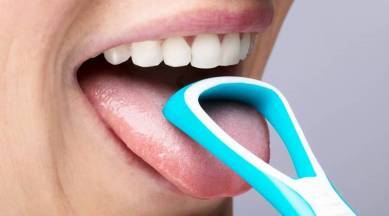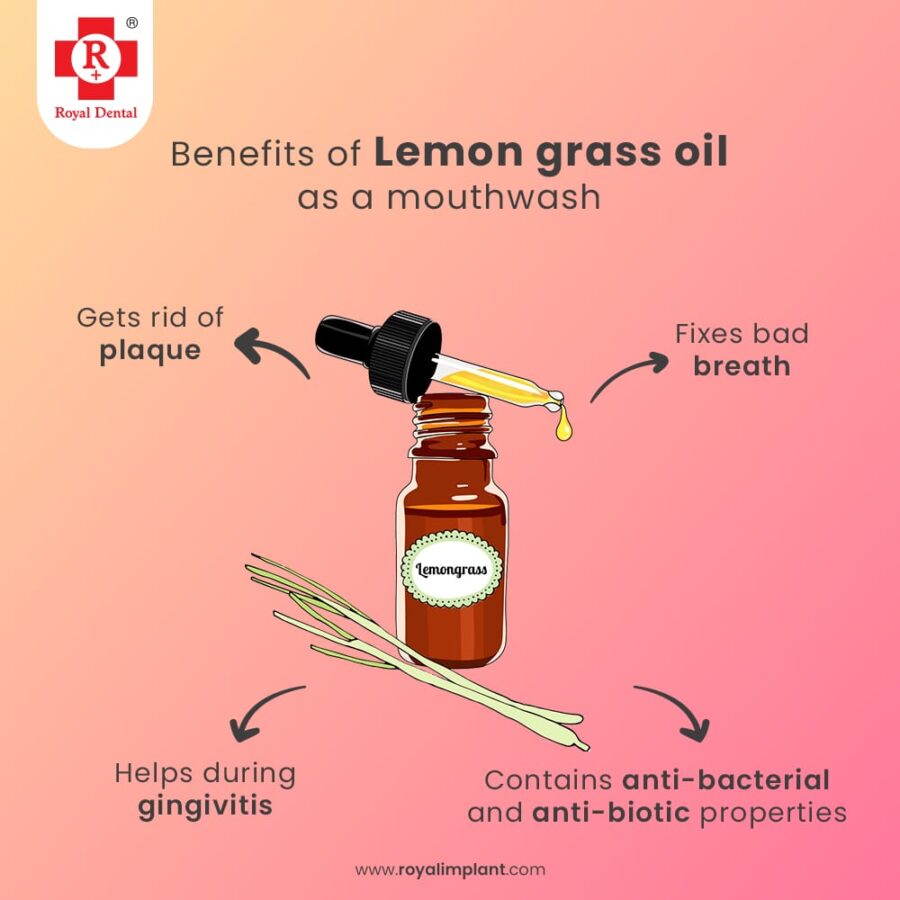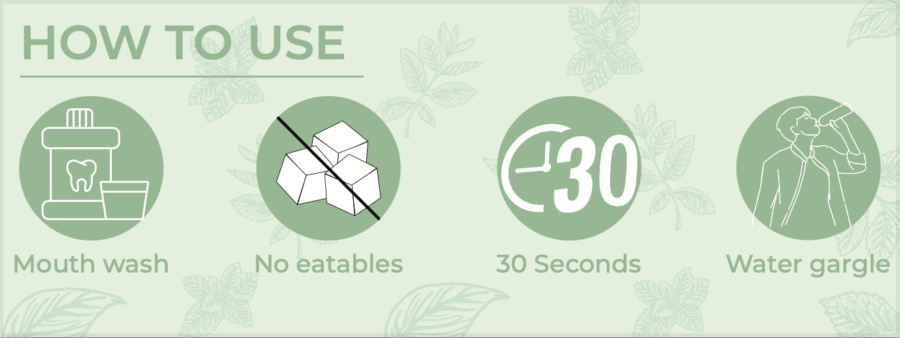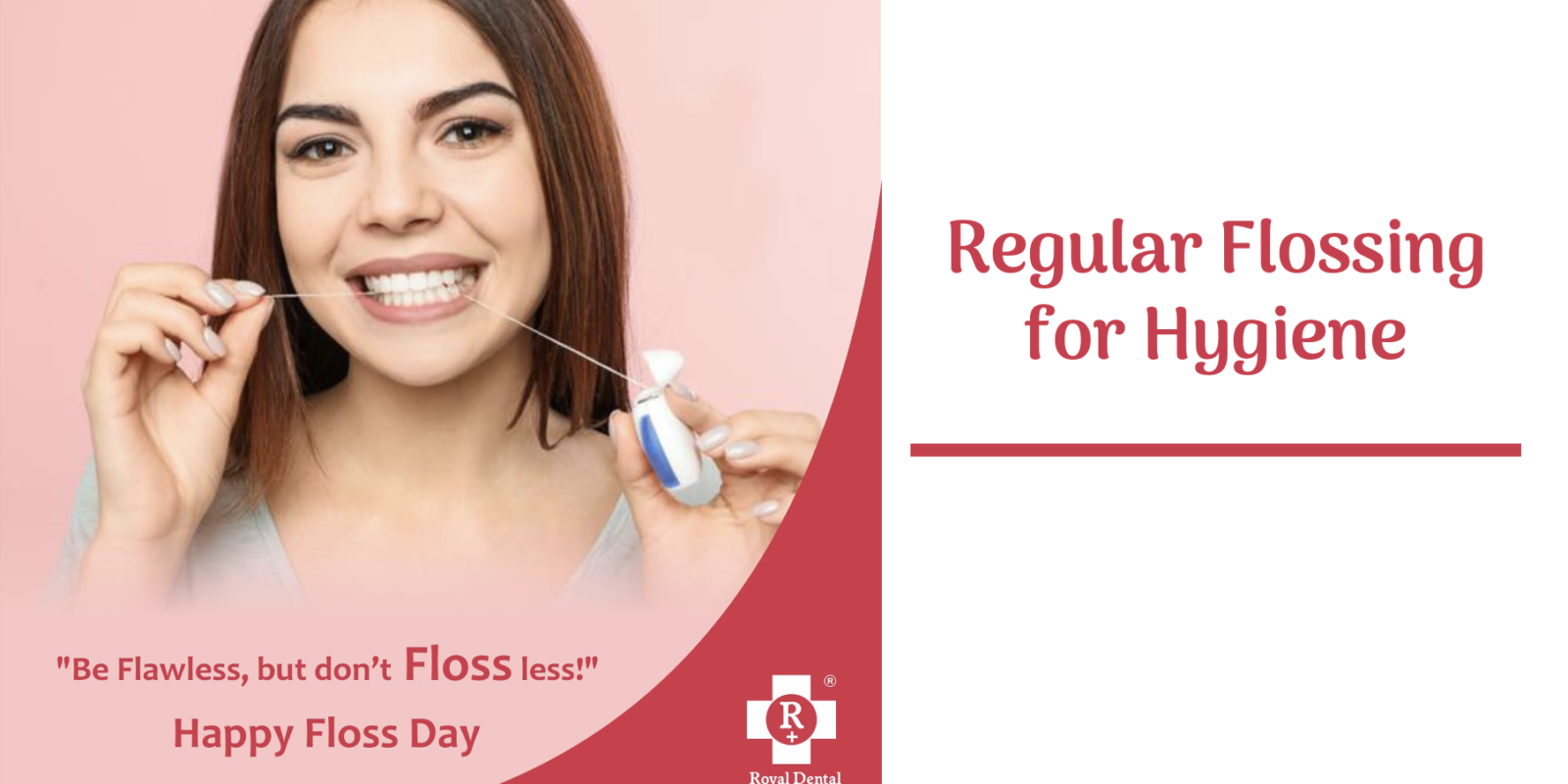You have entered the fascinating world of dental hygiene, home of the perfect smile and sound teeth. While brushing, flossing, and regular dental check-ups are essential aspects of maintaining oral hygiene, there are several lesser-known tips that can further enhance your dental care routine. In this blog, written by Dr. Chirag Chamria of Royal Dental Clinics, we will explore some unique and innovative dental hygiene tips that can help you achieve a healthier, brighter smile (oral health).
Power of Tongue Scraping | Dental Hygiene Tips
When it comes to oral hygiene, most people focus primarily on brushing their teeth and flossing. However, there is one often overlooked aspect of oral care that can have a significant impact on your overall dental health: tongue scraping.
The surface of your tongue can harbor bacteria, food particles, dead cells, and other debris. If left unaddressed, these accumulations can contribute to bad breath, poor oral hygiene, and even affect your sense of taste. Tongue scraping is a simple practice that can help eliminate these unwanted elements and promote better oral health.
Tongue scrapers are small, handheld devices typically made of metal or plastic. They have a slightly curved edge that allows you to gently scrape your tongue from back to front, removing the accumulated debris. This action not only helps keep your breath fresh but also promotes a healthier environment in your mouth.
Here are some key Dental Hygiene benefits of incorporating tongue scraping into your daily oral hygiene routine:
Improved Breath: As mentioned earlier, the buildup of bacteria and debris on your tongue can lead to bad breath. By regularly scraping your tongue, you can effectively remove the source of odor-causing compounds and enjoy fresher breath throughout the day.
Enhanced Oral Hygiene: Tongue scraping complements brushing and flossing by removing additional bacteria and debris that may have settled on the surface of your tongue. This reduces the overall bacterial load in your mouth and contributes to a cleaner, healthier oral environment.
Better Taste Sensation: The accumulation of debris on your tongue can affect your ability to taste food properly. By removing these unwanted substances, you can enhance your taste sensation and fully enjoy the flavors of your favorite meals.
Reduced Risk of Oral Diseases: Bacteria on the tongue can contribute to the development of oral health problems such as tooth decay and gum disease. Tongue scraping helps remove these bacteria, reducing the risk of these dental issues and promoting overall oral health.

To effectively perform tongue scraping, follow these steps:
- Stand in front of a mirror and extend your tongue.
- Hold the tongue scraper with both hands, placing it at the back of your tongue.
- Gently press the scraper against your tongue and move it forward, applying light pressure.
- Rinse the scraper after each pass to remove the collected debris.
- Repeat the scraping process 5-10 times or until your tongue feels clean.
- Finally, rinse your mouth thoroughly with water or mouthwash.
Magic of Oil Pulling | Dental Hygiene Tips
Imagine a natural, centuries-old practice that not only promotes oral health but also provides a range of additional benefits. Enter oil pulling, an ancient Ayurvedic technique gaining recognition and popularity in modern times. Let’s delve into the magic of oil pulling and discover how it can elevate your dental hygiene routine.
Oil pulling involves swishing a tablespoon of oil, such as coconut oil or sesame oil, in your mouth for about 15-20 minutes. During this time, the oil is pulled and pushed between your teeth and around your gums. The swirling action allows the oil to reach areas that may be missed by regular brushing and flossing, providing a thorough cleansing effect.
Here are some remarkable benefits associated with oil pulling:
Oral Detoxification: Oil pulling acts as a detoxifying method for your mouth. As you swish the oil around, it collects toxins, bacteria, and other impurities from your teeth, gums, and tongue. When you spit out the oil, you effectively remove these unwanted substances, leaving your mouth cleaner and healthier.
Reduction in Harmful Bacteria: The oral cavity is home to various strains of bacteria, some of which can contribute to tooth decay, gum disease, and bad breath. Research suggests that oil pulling can help reduce the population of harmful bacteria in the mouth, promoting a more balanced and beneficial oral microbiome.
Improved Gum Health: Oil pulling has been shown to have a positive effect on gum health. By removing plaque and bacteria from the gums, oil pulling can help reduce inflammation, bleeding, and gum sensitivity. Regular practice of oil pulling may even aid in preventing gum disease.
Fresher Breath: One of the notable benefits of oil pulling is its ability to combat bad breath. By eliminating bacteria and toxins, oil pulling can freshen your breath naturally, providing a long-lasting feeling of cleanliness and confidence.
Potential Teeth Whitening: Although not a replacement for professional teeth whitening treatments, oil pulling has been associated with a gradual improvement in tooth color. As the oil interacts with your teeth, it helps remove surface stains, resulting in a brighter smile over time.



Oil pulling can be incorporated into your daily routine in the following steps:
- Begin on an empty stomach, preferably in the morning.
- Take a tablespoon of oil, such as coconut oil or sesame oil, and swish it around in your mouth.
- Gently push and pull the oil between your teeth, ensuring it reaches all areas of your mouth.
- Continue swishing for about 15-20 minutes, allowing the oil to mix with saliva and become thinner.
- Spit out the oil, making sure not to swallow it.
- Rinse your mouth thoroughly with water and follow up with regular brushing and flossing.

Power of Herbal Mouthwash | Dental Hygiene Tips
When it comes to maintaining optimal oral hygiene, using mouthwash is often considered an essential step. While commercial mouthwashes can provide a temporary burst of freshness, they often contain alcohol and other chemicals that may cause dryness or irritation. As an alternative, harnessing the power of herbal mouthwashes can offer a natural and gentle approach to oral care. Let’s explore the benefits and potential of herbal mouthwashes.
Herbal mouthwashes are made by infusing various herbs and natural ingredients known for their oral health benefits. These mouthwashes can provide a range of advantages, such as soothing gums, reducing inflammation, combating bacteria, and promoting overall oral well-being.
Here are some popular herbs and their benefits often found in herbal mouthwashes:
Peppermint: Peppermint is a common herb known for its refreshing scent and cooling properties. In a mouthwash, it can help freshen breath, provide a clean sensation, and even have a mild analgesic effect on oral discomfort.
Sage: Sage has been used for centuries for its antibacterial and anti-inflammatory properties. Incorporating sage into a mouthwash can help reduce inflammation in the gums, alleviate discomfort, and inhibit the growth of harmful bacteria.
Chamomile: Chamomile possesses soothing properties that can benefit oral health. It can help calm irritated gums, promote healing, and provide a gentle and calming experience during oral care routines.
Thyme: Thyme is a potent herb with antibacterial properties. Including thyme in a mouthwash can help combat oral bacteria, reduce plaque formation, and support overall gum health.
Create your herbal mouthwash with a simple process. Here’s a basic recipe:
Ingredients:
- 1 cup of distilled water
- 1 teaspoon of dried herbs (e.g., peppermint, sage, chamomile, thyme)
- Optional: 1 teaspoon of xylitol for sweetness (xylitol has been shown to inhibit the growth of oral bacteria)

Instructions:
- Boil the distilled water and add the dried herbs to create an infusion. Let it steep for 10-15 minutes.
- Strain the mixture to remove the herbs and allow the infusion to cool.
- If desired, add xylitol to sweeten the mouthwash. Stir until it dissolves.
- Transfer the mouthwash into a clean bottle or container for storage.
- Use the herbal mouthwash after brushing and flossing. Swish it around in your mouth for about 30 seconds to a minute, then spit it out.
- Store the mouthwash in a cool, dark place and shake well before each use.
Explore the Benefits of Chewing Gum | Dental Hygiene Tips
Chewing gum is often seen as a simple pleasure or a way to freshen breath, but it offers more benefits than meets the eye. When done correctly, chewing sugar-free gum can provide several advantages for your oral health. Let’s explore the benefits of chewing gum and how it can be a valuable addition to your dental hygiene routine.
Stimulates Saliva Production: Chewing gum increases saliva production, which protects your mouth. Saliva neutralizes microbial acids, remineralizes dental enamel, and removes food particles. Saliva increases oral health and prevents tooth decay.
Cleans Teeth and Reduces Plaque: Chewing gum helps remove plaque from teeth. This reduces plaque, a bacteria-filled coating that causes tooth decay and gum disease. Chewing gum may enhance brushing and flossing for optimum oral hygiene.
Freshens Breath: Mint or cinnamon-flavored gum might temporarily disguise foul breath. It promotes saliva flow and reduces mouth dryness, which may produce foul breath. Chewing gum doesn’t fix foul breath, but good dental hygiene can.
Relieves Dry Mouth: Insufficient saliva production causes dry mouth, or xerostomia. This might cause pain, difficulties swallowing, and dental issues. Sugar-free gum stimulates saliva flow and temporarily relieves dry mouth.
Xylitol Benefits: Xylitol is used in several sugar-free gums. Xylitol inhibits oral microorganisms, preventing tooth decay. Chewing xylitol-sweetened gum regularly may help prevent cavities.
To maximize the benefits of chewing gum, keep the following tips in mind:
- Choose sugar-free gum: Look for gum that is labeled “sugar-free” and preferably sweetened with xylitol. Sugar-free gum prevents the negative effects of sugar on your teeth and reduces the risk of tooth decay.
- Chew for about 20 minutes: Aim to chew gum for about 20 minutes after meals. This duration allows sufficient time for saliva production and plaque removal without overtaxing your jaw muscles.
- Don’t substitute gum for brushing and flossing: Chewing gum should not replace regular brushing and flossing. Instead, view it as a supplementary practice to enhance your oral hygiene routine.
Role of Probiotics in Oral Health | Dental Hygiene Tips
When you hear “probiotics,” you may think of intestinal health. These good bacteria may also protect dental health, according to a new study. Probiotics may balance the oral flora, lowering the incidence of cavities, gum disease, and other oral health concerns. Probiotics may improve oral hygiene.
Restoring Microbial Balance: Oral microorganisms form a complex ecology. Disrupting this equilibrium allows dangerous germs to grow, causing oral health issues. Streptococcus salivarius K12 and Lactobacillus reuteri probiotics may restore oral microbial equilibrium. They fight dangerous microorganisms and improve dental health.
Inhibiting Harmful Bacteria: Antimicrobial probiotics may directly block pathogenic microorganisms that cause tooth decay, gum disease, and foul breath. These helpful bacteria make oral health infections more unfriendly.
Strengthening the Immune System: Probiotics boost gut and oral immunity. Infections and dental health need a strong immune system. Probiotics boost the immune system and lower oral infection risk.
Preventing and Reducing Gum Inflammation: Periodontal disease—gum inflammation and infection—is a prevalent oral health condition. Certain probiotic strains may lower gum disease-related inflammation, bleeding, and pocket depths. Probiotics improve gum health and prevent periodontal disease.
Incorporating probiotics into your oral care routine can be done in various ways:
Supplements: Probiotic supplements specifically designed for oral health are available in the form of capsules, lozenges, or powders. These supplements contain specific strains of beneficial bacteria that can colonize the oral cavity and promote oral health.
Probiotic-Rich Foods: Some fermented foods, like yogurt, kefir, sauerkraut, and kimchi, contain live cultures of beneficial bacteria. Regularly consuming these foods can introduce probiotics into your system and potentially benefit your oral health.
Probiotic Mouthwashes or Toothpaste: Some oral care products now incorporate probiotics into their formulations. These products can deliver probiotics directly to the oral cavity, helping to rebalance the oral microbiome and support oral health.
Conclusion
As we conclude this journey through lesser-known dental hygiene tips, we hope you have discovered some intriguing and effective techniques to enhance your oral care routine. Remember, maintaining good dental hygiene not only helps prevent tooth decay and gum disease but also contributes to your overall well-being. Dr. Chirag Chamria and the team at Royal Dental Clinics encourage you to explore these innovative practices while staying consistent with the fundamentals of brushing, flossing, and regular dental visits. Let these lesser-known tips guide you toward a healthier, brighter smile that radiates confidence and happiness.
© All rights reserved by Royal Dental Implants Pvt Ltd
Issued in public interest






